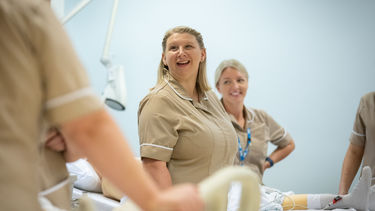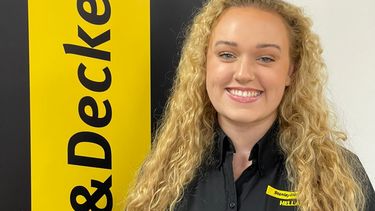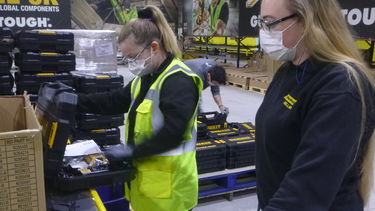- The University of Sheffield is highlighting the importance of apprenticeships to the NHS and UK industries such as advanced manufacturing
- Apprenticeships at Sheffield are developed and delivered in collaboration with industry - helping employers respond to needs and changes - ensuring skill levels are maintained in their workforces
- Sheffield is one of only two universities in England to be awarded Expert Apprenticeship Provider status in a pilot scheme by the Department of Education (DfE)
Apprenticeships are vital to the NHS and are playing a key role in closing the skills gap in industries such as advanced manufacturing, according to the University of Sheffield.
The Russell Group university is highlighting the importance of apprentices to mark National Apprenticeship Week (5-11 February 2024).
Sheffield has long been a provider of apprenticeships, with its schemes now well established and successful. Its training programmes are developed and delivered in collaboration with industry, enabling employers to respond to their current and future specialist skills needs.
The University’s commitment to developing excellent apprenticeship provision has led to it being awarded Expert Apprenticeship Provider status by the Department of Education (DfE) - one of only two universities in England to be given the status.
The pilot is a mark of excellence and will see the University work alongside others to inform improvements to apprenticeship provision nationally, to ensure SMEs, training providers and apprentices get the most out of the apprenticeship system.
This year marks the 10th anniversary of apprentices being trained at its AMRC Training Centre. Drawing on the expertise of neighbouring world-leading research and innovation cluster, the University of Sheffield Advanced Manufacturing Research Centre (AMRC) - a hugely successful R&D facility that has set a new standard for academic and industry collaboration - the AMRC Training Centre is creating a new generation of engineers, skilled in areas such as welding, automation and controls engineering, as well as composites, toolmaking, mechanical manufacture and nuclear manufacturing. These are all skills that are vital to industries in South Yorkshire and across the UK and allow apprentices to make a key difference in closing the skills gap.
The University of Sheffield also trains apprentices for the NHS in its School of Allied Health Professions, Nursing and Midwifery. Its programmes enable apprentices to make a major contribution to frontline NHS services by applying the University’s latest pioneering health research to their practice and developing the leadership and problem-solving skills to practice safely and effectively.
Sheffield also recently launched a Speech and Language Therapy degree apprenticeship. The four year programme enables people to combine work and study, experience a wide range of roles in the profession, before qualifying to practise as a Speech and Language Therapist.
Sambit Sen, Director of Apprenticeships at the University of Sheffield, said: “For people considering their next step in life, apprenticeships are a fantastic opportunity to learn new skills while also earning money. They help you gain a solid understanding of an industry you are interested in and train with leading experts from the field, both of which put you on a path to a rewarding and successful career.
“At the University of Sheffield, we are committed to delivering apprenticeships that meet the career aspirations of both individuals and industry. We are also determined to make education accessible to all, with a quarter of our apprentices coming from disadvantaged backgrounds and our work in this area continuing. If you are interested in an apprenticeship, explore the opportunities available, it could be the next step you are looking for.”
The University of Sheffield has trained more than 2,600 apprentices across its AMRC Training Centre and School of Allied Health Professions, Nursing and Midwifery. Its AMRC Training Centre has worked with more than 400 businesses since opening.
Lucy Hattersley recently completed a degree apprenticeship with the University of Sheffield AMRC Training Centre, qualifying in Manufacturing Engineering and a bachelor’s degree in Manufacturing Technology. Throughout her apprenticeship, she worked as a quality engineer at Stanley Black & Decker at their Hellaby site in Rotherham. She now works in product qualification, process control and improvements.
Lucy said: “My overall experience of my apprenticeship has been fantastic, I couldn’t have imagined a more successful route to my ideal career. This method of learning allowed me to gain the practical skills required for my job, whilst still catering to my desire to study and develop my knowledge base for my field of work. Completing my apprenticeship has been a massive achievement and has opened so many doors for me as an engineer. I can now build on the knowledge and experiences that my course and work placement have given me, which I am currently doing through a masters degree in Engineering Management.
“During my apprenticeship, I developed a lot both professionally and personally. Working alongside my studies gave me the soft skills I otherwise might have missed out on if I had chosen another mode of study. Working with other engineers, being part of project teams, and interacting with global team members within the business brought me along so much in my career and gave me an experience you simply don’t get from just studying alone. Putting myself into a professional environment allowed me to grow as a person and shape the engineer I have become. It also allowed me to be financially self-sufficient whilst working in an environment that I knew would help me develop my career in engineering.”
Nichola Crozier is currently an apprentice on the University of Sheffield’s speech and language therapy apprenticeship programme. There are 20 apprentices on the course from across the North of England, all of whom have a wide range of experiences, knowledge and skills. Despite being from across the north, Nichola says the group has quickly become close-knit and incredibly supportive of each other.
Nichola said: “All of the group members are willing to share their knowledge and experiences and pass on ideas and resources to aid in our studies. We have our own WhatsApp Group and there is always someone to respond to a message of help if we need it. With us being a close supportive group we really do feel like we are all in it together and not just the apprentices – the programme leaders and the lectures too.
“My days are very different as they are broken down into study days and work-based learning days. Monday and Tuesdays are currently my university days. I complete these days working from home. Study days include a mixture of lectures, directed study packages including core reading and answering questions, and self study days – which I use for extended learning of the directed study packages, revision, assignment writing and completing worked-based reflection evidence for my knowledge, skills and behaviours – these are competencies that I have to show that I have met in order to complete the course.
“On Wednesdays, Thursdays and Fridays, I go to my normal place of work for my work-based learning days at Blackpool Teaching Hospital. I support patients in the community with communication and swallowing difficulties, work with patients in their own home, in clinic settings and via Tele- Health services. I use my work-based learning days to continue developing my skills within my place of practice. I have opportunities to work with, shadow and learn from experienced qualified Speech and Language Therapists (SLTs) to increase my scope of practice. The aim is that by the end of the four years I will have achieved all of the knowledge and skills to be able to be a competent fully functioning SLT.”
Discussing why she decided to do an apprenticeship, Nichola said: “I had been working as an NHS Speech and Language Therapy assistant since 2009, I knew that I wanted to be a qualified Speech and Language Therapist but going to university to complete a degree didn’t seem feasible due to having a young family, finances etc. The Speech and Language Therapy Apprenticeship is an amazing opportunity for me. Finally making my dream of becoming a qualified SLT a tangible goal.
I value the teaching and support given to me by the University, but also the fantastic learning opportunities given to me in my place of work by the qualified Speech and Language Therapists I work with everyday at Blackpool Victoria Hospital. Post qualification, being a ‘home-grown’, skilled SLT I look forward to being able to give back to that wonderful team that will have supported me through it.”
Nichola added: “An undergraduate degree or a postgraduate qualification is not for everyone. I do believe this new and exciting way to train people and give people the experience and opportunity like me an alternative route into the profession can only be a great thing.”
Professor Koen Lamberts, Vice-Chancellor of the University of Sheffield, said: “We are proud to be a provider and employer of apprentices at the University of Sheffield. Apprenticeships, alongside traditional degrees, are a vital part of the UK’s education system and a viable route that people should consider when planning the next step in their career. We need both traditional degrees and apprenticeships for the system to be successful, as together they provide the range of skills that employers need now and in the future.”
More information on apprenticeships at the University of Sheffield







